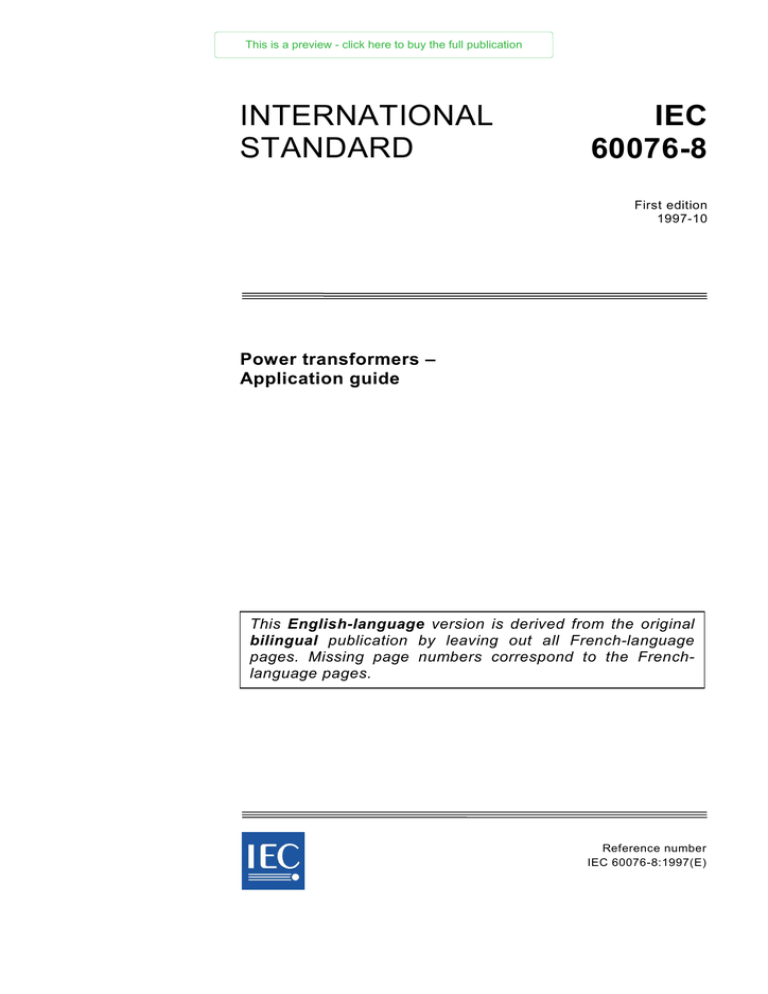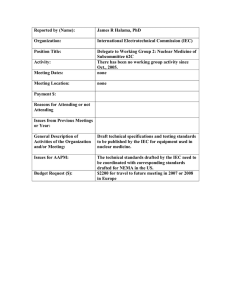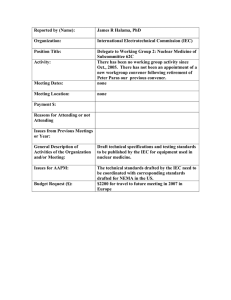
This is a preview - click here to buy the full publication
INTERNATIONAL
STANDARD
IEC
60076-8
First edition
1997-10
Power transformers –
Application guide
This English-language version is derived from the original
bilingual publication by leaving out all French-language
pages. Missing page numbers correspond to the Frenchlanguage pages.
Reference number
IEC 60076-8:1997(E)
This is a preview - click here to buy the full publication
INTERNATIONAL
STANDARD
IEC
60076-8
First edition
1997-10
Power transformers –
Application guide
IEC 1997 Copyright - all rights reserved
No part of this publication may be reproduced or utilized in any form or by any means, electronic or mechanical,
including photocopying and microfilm, without permission in writing from the publisher.
International Electrotechnical Commission, 3, rue de Varembé, PO Box 131, CH-1211 Geneva 20, Switzerland
Telephone: +41 22 919 02 11 Telefax: +41 22 919 03 00 E-mail: inmail@iec.ch Web: www.iec.ch
Com mission Electrotechnique Internationale
International Electrotechnical Com m ission
Международная Электротехническая Комиссия
PRICE CODE
XC
For price, see current catalogue
This is a preview - click here to buy the full publication
60076-8 IEC:1997
–3–
CONTENTS
Page
FOREWORD ...................................................................................................................
5
Clause
1 General ....................................................................................................................
7
2 Characteristic properties of different three-phase winding combinations and
magnetic circuit designs ...........................................................................................
9
3 Characteristic properties and application of auto-connected transformers..................
17
4 Zero-sequence properties – neutral load current and earth fault conditions,
magnetic saturation and inrush current .....................................................................
25
5 Calculation of short-circuit currents in three-winding, three-phase transformers
(separate winding transformers and auto-connected transformers)
with earthed neutrals ................................................................................................
51
6 Parallel operation of transformers in three-phase systems.........................................
81
7 Calculation of voltage drop for a specified load, three-winding transformer load loss .
93
8 Specification of rated quantities and tapping quantities .............................................
125
9 Convertor applications with standard transformers ....................................................
147
10 Guide to the measurement of losses in power transformers.......................................
151
Annex A – Basic relations for single-phase and two-phase earth faults .............................
165
This is a preview - click here to buy the full publication
60076-8 IEC:1997
–5–
INTERNATIONAL ELECTROTECHNICAL COMMISSION
_________
POWER TRANSFORMERS –
APPLICATION GUIDE
FOREWORD
1) The IEC (International Electrotechnical Commission) is a worldwide organization for standardization comprising
all national electrotechnical committees (IEC National Committees). The object of the IEC is to promote
international co-operation on all questions concerning standardization in the electrical and electronic fields. To
this end and in addition to other activities, the IEC publishes International Standards. Their preparation is
entrusted to technical committees; any IEC National Committee interested in the subject dealt with may
participate in this preparatory work. International, governmental and non-governmental organizations liaising
with the IEC also participate in this preparation. The IEC collaborates closely with the International Organization
for Standardization (ISO) in accordance with conditions determined by agreement between the two
organizations.
2) The formal decisions or agreements of the IEC on technical matters express, as nearly as possible, an
international consensus of opinion on the relevant subjects since each technical committee has representation
from all interested National Committees.
3) The documents produced have the form of recommendations for international use and are published in the form
of standards, technical reports or guides and they are accepted by the National Committees in that sense.
4) In order to promote international unification, IEC National Committees undertake to apply IEC International
Standards transparently to the maximum extent possible in their national and regional standards. Any
divergence between the IEC Standard and the corresponding national or regional standard shall be clearly
indicated in the latter.
5) The IEC provides no marking procedure to indicate its approval and cannot be rendered responsible for any
equipment declared to be in conformity with one of its standards.
6) Attention is drawn to the possibility that some of the elements of this International Standard may be the subject
of patent rights. The IEC shall not be held responsible for identifying any or all such patent rights.
International Standard IEC 60076-8 has been prepared by IEC technical committee 14: Power
transformers.
This first edition of IEC 60076-8 cancels and replaces IEC 60606 published in 1978. This
edition constitutes a technical revision.
The text of this standard is based on the following documents:
FDIS
Report on voting
14/260/FDIS
14/297/RVD
Full information on the voting for the approval of this standard can be found in the report on
voting indicated in the above table.
IEC 60076 consists of the following parts, under the general title: Power transformers.
Part
Part
Part
Part
Part
1:
2:
3:
5:
8:
1993,
1993,
1980,
1976,
1997,
General
Temperature rise
Insulation levels and dielectric tests
Ability to withstand short circuit
Application guide
Annex A is for information only.
This is a preview - click here to buy the full publication
60076-8 IEC:1997
–7–
POWER TRANSFORMERS –
APPLICATION GUIDE
1 General
1.1 Scope and object
This Standard applies to power transformers complying with the series of publications
IEC 60076.
It is intended to provide information to users about:
– certain fundamental service characteristics of different transformer connections and
magnetic circuit designs, with particular reference to zero-sequence phenomena;
– system fault currents in transformers with YNynd and similar connections;
– parallel operation of transformers, calculation of voltage drop or rise under load, and
calculation of load loss for three-winding load combinations;
– selection of rated quantities and tapping quantities at the time of purchase, based on
prospective loading cases;
– application of transformers of conventional design to convertor loading;
– measuring technique and accuracy in loss measurement.
Part of the information is of a general nature and applicable to all sizes of power transformers.
Several chapters, however, deal with aspects and problems which are of the interest only for
the specification and utilization of large high-voltage units.
The recommendations are not mandatory and do not in themselves constitute specification
requirements.
Information concerning loadability of power transformers is given in IEC 60354, for oilimmersed transformers, and IEC 60905, for dry-type transformers.
Guidance for impulse testing of power transformers is given in IEC 60722.
1.2 Normative references
The following normative documents contain provisions which, through reference in this text,
constitute provisions of this International Standard. At the time of publication, the editions
indicated were valid. All normative documents are subject to revision, and parties to
agreements based on this International Standard are encouraged to investigate the possibility
of applying the most recent edition of the normative documents indicated below. Members of
IEC and ISO maintain registers of currently valid International Standards.
IEC 60050(421):1990, International Electrotechnical Vocabulary (IEV) – Chapter 421: Power
transformers and reactors
IEC 60076: Power transformers
IEC 60076-1:1993, Power transformers – Part 1: General
This is a preview - click here to buy the full publication
60076-8 IEC:1997
–9–
IEC 60076-3:1980, Power transformers – Part 3: Insulation levels and dielectric tests
IEC 60289:1988, Reactors
IEC 60354:1991, Loading guide for oil-immersed power transformers
IEC 60722:1982, Guide to the lightning impulse and switching impulse testing of power
transformers and reactors
IEC 60905:1987, Loading guide for dry-type power transformers
IEC 60909:1988, Short-circuit current calculation in three-phase a.c. systems
IEC 60909-1:1991, Short-circuit current calculation in three-phase a.c. systems – Part 1:
Factors for the calculation of short-circuit currents in three-phase a.c. systems according to
IEC 60909 (1988)
IEC 60909-2:1992, Electrical equipment – Data for short-circuit current calculations in
accordance with IEC 60909 (1988)
IEC 61378-1: 1997, Convertor transformers – Part 1: Transformers for industrial applications
ISO 9001: 1994, Quality systems – Model for quality assurance in design, development,
production, installation and servicing
2
Characteristic properties of different three-phase winding combinations
and magnetic circuit designs
This chapter is an overview of the subject. Additional information is given in clause 4 on zerosequence properties.
2.1 Y-, D-, and Z-connected windings
There are two principal three-phase connections of transformer windings: star (Y-connection)
and delta (D-connection). For special purposes, particularly in small power transformers,
another connection named zigzag or Z is also used. Historically, several other schemes have
been in use (such as "truncated delta", "extended delta", "T-connection", "V-connection", etc.).
While such connections are used in transformers for special applications, they no longer
appear in common power transmission systems.
2.1.1 Advantages of a Y-connected winding
This type of winding:
– is more economical for a high-voltage winding;
– has a neutral point available;
– permits direct earthing or earthing through an impedance;
– permits reduced insulation level of the neutral (graded insulation);
– permits the winding taps and tapchanger to be located at the neutral end of each phase;
– permits single-phase loading with neutral current (see 2.2 and 4.8).




